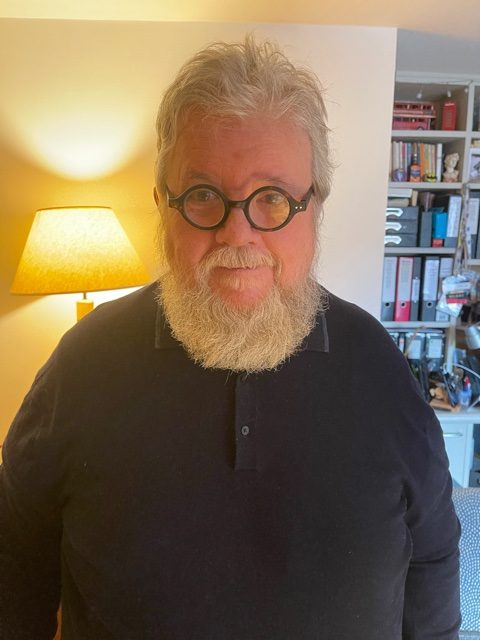
Ian McNeice found his love for theatre in his days at boarding school, where his outrageous style made him stand out. However, his early acting career saw him struggling with his stammer and sweeping the floors of Salisbury Playhouse Theatre.
Fast forward and this boy from Basingstoke is starring in Hollywood next to Jim Carrey, being driven through Los Angeles by an up-and-coming actress called Cameron Diaz and working with the likes of Tom Cruise, Johnny Depp and Kenneth Branagh, to name-drop just a few.
In more recent times, he has found a new home in a quiet corner of Cornwall, portraying loveable local rogue Bert Large in the hit TV series Doc Martin. It’s a role that has seen him become an international sex symbol in his seventies and may even lead to a spin-off…
Hi Ian. I guess the best place to start is the beginning. How was life growing up?
I had a good family life, me and my parents, it was just the three of us really. Until the age of about 8 or 9, when I went away to boarding school in Taunton, Somerset. It’s strange because I didn’t really want to go away to school, but I think my father thought it would be a good learning exercise.
Was that something he had done?
No. My father worked for Eli Lilly and Company, which is an American drug firm. He started as a representative and built his way up, all the way to virtually running the company in Basingstoke. He and my mother both came from Blackpool, from a very working class background. I think he was impressed with a friend of his who had sent his son away to boarding school, and thought it would give me a proper education; something that he never had himself.
You had a tragedy in your family life early on?
My older brother, Alistair. Around the age of 10 he was knocked down by a car as he was going across the road. He went behind the bus, instead of going the right way in front of the bus. He got knocked down by a car and was killed. I think that was part of the reason for my father wanting me to go away to boarding school; he felt that my mother would be over-protective of me. He didn’t want me over mollycoddled! I don’t think she wanted me to go at all, it was very much his instruction.
Did you get on well with your mother?
Yes I did, absolutely. She was a traditional mum, she stayed at home and didn’t work. We had a very good relationship and I loved her cooking obviously. We got on famously! When she died it was a very sad day when I finished the last apple pie of hers left in the freezer.
Do you have memories of leaving home and going to boarding school?
Yes. What’s funny is that public schools are very keen on sport. I was always very sad that I couldn’t achieve what my father would have like me to have done. He was a very keen sportsman himself; he played rugby and football. If I had managed to play in the first XV rugby team at school, I think that would have been the zenith of his life, but (laughs) I never got anywhere near that! I think my sporting achievement was to play in the third hockey team, called the Rabbits. But then I managed to shine in another area. Luckily we had a principle who was keen to encourage the arts, so we had a big drama department in the school and that’s where I shone. Thank goodness at least I could do something!
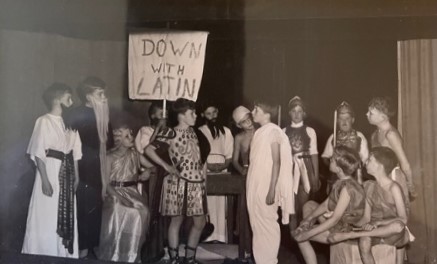
Where did that start?
Very early on. Before Taunton I actually went to Thone School which was the preparatory school, and I appeared in a play there. I’d lived in America for a year with my father beforehand; he went to Harvard for a year to do some business studies. When I came back I had a full American accent, and I was very American. So I did a Roman play and I appeared as a Roman soldier; just a walk-on part. I was standing in a long line of soldiers and I had to fall asleep, and when all the other soldiers went off I was left alone on stage. Someone walked on and I said: ‘Gee Buster, which way did they go?’ with a big American accent. And then the laughter that I heard from the audience; I knew. In that one moment I knew what I wanted to do, it was as simple and as plain as that.
Had you gone into theatre at school thinking that was something you would pursue?
No. It was as simple as being on stage and hearing an auditorium laugh out loud at something that I did; it was such a drug. It was such an extraordinary thing! And I knew that’s what I wanted to do. I knew I wanted to act, I knew I wanted to do theatre. So from then on I did lots of other plays, I did Billy Bunter, Toad of Toad Hall, Sweeney Todd and my examinations went out the window. I did very poorly at O-levels, very poorly at A-Levels, but by God there I was in all these plays!
What influence did going to Taunton School have on your subsequent career?
We used to go and visit the Bristol Old Vic Theatre to see plays with the Drama department. Eventually the Rugby club started coming with us and they would sneak out to go and get a pint of beer in the pub next door. But for me it was very interesting to go and see all of those plays. For the final play I did at school an actor from the Bristol Old Vic called Chris Harris came down and watched. He was an ex-Tauntonian himself; now a proper actor and actually I’d seen him in some of those plays. He came to see my play, which was Charlie’s Aunt, and my father was completely mesmerised by him. At the end my dad practically held him up against the wall and asked: ‘What do you think, what do you think? Do you think my son has got a chance? Do you think he should do this?’ This poor actor looked at him and said: ‘I’ve got no idea. But all I can say is that if he doesn’t try he’ll regret it for the rest of his life.’ It was the most wonderful thing he could have said.
Did it re-affirm what you were already thinking at that point?
Yes, I knew exactly what I wanted to do. I had no idea how to do it, but I just knew. There was nothing else. My father had put me forward for a vocational guidance test and at the end of it my two things were that I should either be a Journalist or an Estate Agent. So my father said: ‘Oh, be an estate agent because they play golf on a Thursday afternoon.’ I said: ‘Great, dad.’
So your father had hoped you’d excel at sports, and then advised you to be an estate agent. What was his reaction when he knew that you were going to pursue acting?
Absolutely flabbergasted! A lot of actors follow their parents who were actors before them so there is a history behind it and they know what to do. But he had no grasp of how I would do this.
So what did you do?
The Salisbury Playhouse was the first job I got. I was the assistant stage manager, so I swept the stage, made the tea and the rest of it. Then I started to get a few little parts here and there. In the two years I was there towards the end I got quite a big part and I remember my father bringing down several people over several nights to show them this play. So by then he had a grasp that maybe there was something there! Very soon after that he had a stroke, so he never really saw me do anything else. I do remember when I did Humpty-Dumpty at Leatherhead, we got him to come down with a nurse and a wheelchair. At the end the nurse said: ‘He didn’t sleep once, he was awake the whole time,’ which was great.
That must have meant a lot to you?
Yes it did. It was great that we could do that and very soon after he died. So he never saw anything else I did.
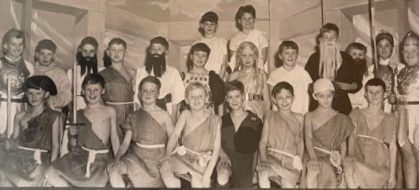
What is your advice to current students at Taunton School or any young aspiring actor?
I’ve always thought that being an actor is not really a job. It’s more of a vocation. It something you’ve got to really want to do. Because there is so much rejection in this business. You’re constantly going up for auditions where you don’t get the job, you’re struggling against other people and it gets worse and worse as you go further up the line. A lot of people ask ‘How should I begin?’ to which I say you should go to Drama School. I went to LAMDA (London Academy of Music and Dramatic Art) for three years. That’s your grounding. You learn your trade there, you learn how to do theatre, etc. I’ve always been amazed by Hollywood, where people get off a Greyhound bus in LA. They just arrive and think they are going to be a movie star and they’ve had no training or anything.
So your experience at LAMDA was a positive one?
Absolutely. I got to play some really good parts and I managed to get an agent at the end. I was 18 when I went to the Salisbury playhouse, 20 when I left and was desperate to have a student life. I managed to go to LAMDA and have a student life, so I was thrilled I got in! They only take very few people and a lot of people apply, so to get in is an achievement in itself.
What do you think they saw in you?
I don’t know because I didn’t get in the first time I tried! At the end of my first year at the Salisbury Playhouse someone said: ‘You should go to Drama school.’ So I applied to several schools, including LAMDA, but I didn’t get in. But they said you should go away and come again next year, and that’s exactly what I did. And the second year I went to LAMDA I got in. Whether they think I matured or something I don’t know!
So you actually worked in Salisbury first?
Yes. When I left school I spent three or four months going to various theatres all over England. I went from Brighton to Barrow-in-Furness, trying to get a job as an assistant stage manager. But I couldn’t get one. I turned up at the Salisbury Playhouse and the guy who ran it, Reggie Salberg, looked at me and said: ‘That scarf you’re wearing. What scarf is that? Where is it from?’ I said: ‘It’s a Taunton School scarf.’ He said, ‘Oh, OK, hang on.’ He vanished for about 10 minutes, then he came back and he said: ‘We have an actor here who wears the same scarf.’ I asked if it was Chris Harris. He said: ‘Yes, it is.’ So the actor who had been to see me in the play at Taunton School was working the very same day I turned up at the Salisbury Playhouse! Reggie Salberg came back and said: ‘Chris told me you were outrageous in Charlie’s Aunt.’ I didn’t know what he meant, so I just said: ‘Oh, thank you.’ But I got the job, and that was it. That was my start, a real huge piece of luck. Amazing!
You started as Assistant Stage Manager?
My first show at the Salisbury Playhouse was Cinderella, and there was a coal house at the back of the theatre. My first job was mucking out the ponies that drew the coach, and I remember thinking to myself ‘I can’t get any lower than shovelling shit in the theatre,’ and that’s how I started!
Well if you start at the bottom then the only way is up!
The only way is up from shovelling shit!
Were you happy at Salisbury Theatre, even if it wasn’t exactly what you wanted to do?
Can I tell you, I worked seven days a week. Basically you’d spend the weekends taking down the set, putting the new set up. The carpenters would come in and we’d help as much as we could. You’d be at rehearsals, you’d be making the props, doing sound, you’d work throughout the day. Then there would come a time where all the actors who had been rehearsing left, and we’d set up for the evening’s play. They’d clear off, so we’d sweep the stage, get the props set out, sort the sound out two hours before. Then the play would start, I’d open the curtains and do all these jobs. I remember thinking: one day I’ll be an actor, then I can leave at five o’clock and I wouldn’t have to do any of this. I could go home, have supper then come back and do the play. (Laughs).
A real apprenticeship.
That’s right. But I loved every minute! I cannot tell you, I was in heaven. I didn’t look on it as a job, it was something I loved doing. And that’s really how I’ve viewed everything ever since. To be so lucky to do something I didn’t consider to be a job. I really enjoyed doing it and getting paid was just a bonus on top.
From mucking out horses and sweeping floors, how did you go about getting parts in productions?
Eventually they gave me various little roles in the plays. I think I was a tramp in the The Cherry Orchard, I was the vicar in the ugly sisters tea party in Cinderella and so on. Gradually the parts got bigger and bigger as time went on. But you still did all your stage work, sweeping the floors, making the tea. That was the progression within the Playhouse.
What did you do next?
I did a lot of regional work. When I first left drama school I went to the Ludlow Festival where I did a Shakespeare play. I will tell you a quick story about how I got there. When I was at school I had a stammer, quite a big stammer. What a joke itself, how does a kid with a stammer want to be an actor?! Somehow, when I learned a part I could get over the stammer, but until then I would stammer away. At Drama School my stammer was still pretty thick, and I remember this one time I turned up for this first day of rehearsal with a new Director, Phillip Grout and I had quite a big part to play. I turned up late, so I didn’t have a chance to explain to him: ‘Look I’ve got this stammer but I will get better.’ So we did the read-through and I stammered through it. At the end I said to the Director: ‘Look I….I’m terribly….I’m terribly…sorry but….I have… I have this stammer…but I’ll…get better…I promise you’. He turned to me and said: ‘Well that…well that that’s…O…OK…because…I…I…have one…too.’ But we set each other off! We couldn’t speak to each other, we had to write notes or we’d go into stammering oblivion.
That sounds like a sketch.
It was hysterical! But he gave me my first theatrical job out of Drama school, he was doing a play at the Ludlow festival, I think Hamlet, and he got me to play the grave-digger, so I left Drama school with a job to go to because he took me there which was brilliant. As well as the Salisbury Playhouse I also worked in Stoke-on-Trent, the Sheffield Crucible and the Thorndike Theatre Leatherhead. So a lot of regional theatre. And then I went to the RSC (Royal Shakespeare Company) for four years.
How did you end up there?
I did a play As You Like It at the Sheffield Crucible in I which I played Touchstone; quite a big part. The casting Director from the RSC, Joyce Nettles, came to see the play at Sheffield, which is what casting Directors used to do tour around regional theatre headhunting for actors. She saw me in the play, liked what she saw and said: ‘Come and audition for the RSC’, which is what I did. And then I got in! You had the big theatre in those days and then The Other Place which was a tiny little theatre, which did new work. And I was lucky enough to do most of my work there; small plays, new plays.
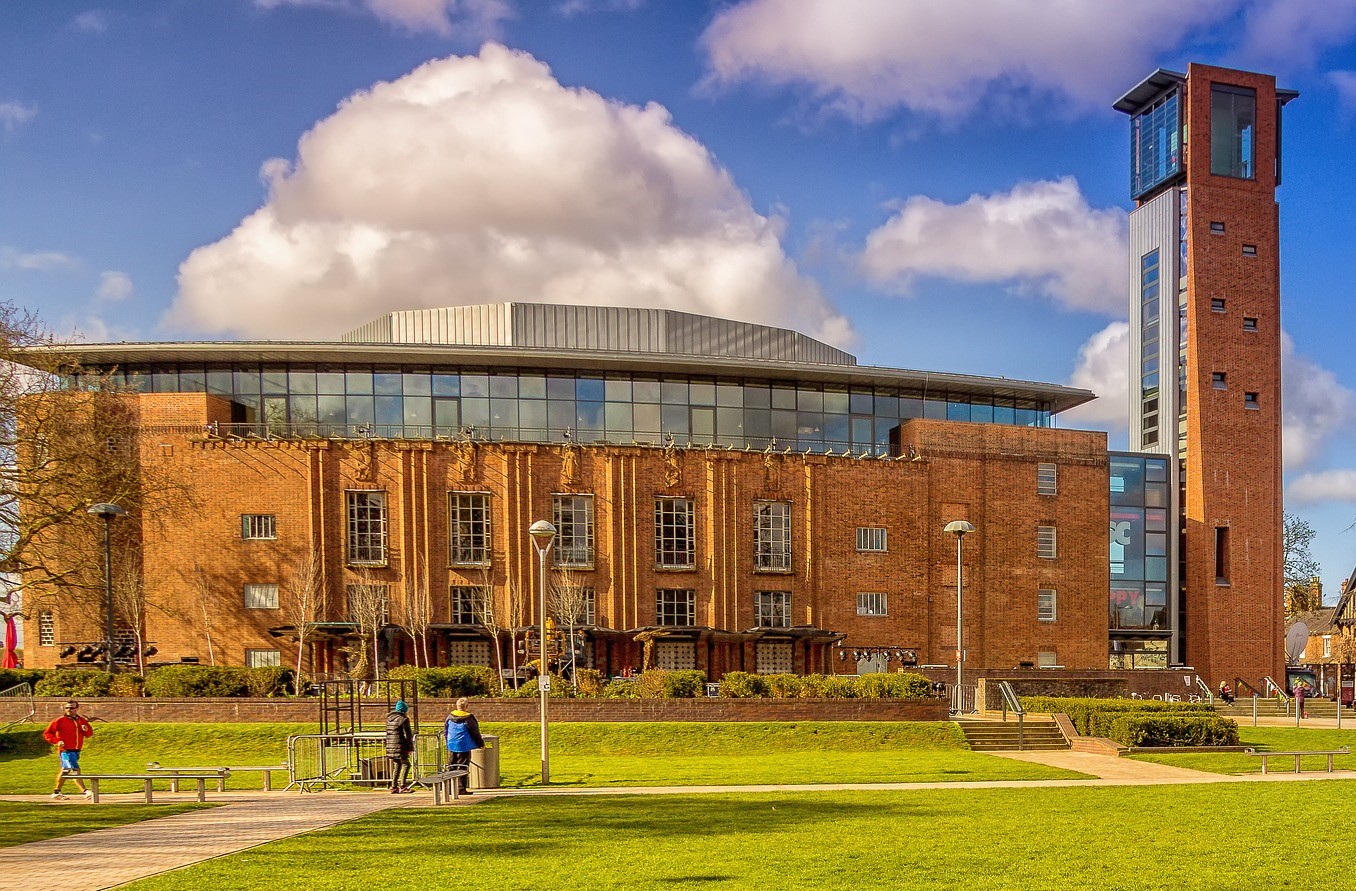
Why do you say you were fortunate to work in the small theatre?
Working on brand-new plays is very interesting because you have the writers there. So you are rehearsing and they are re-writing as you go along. What you are providing at the end of rehearsals is a premiere, which is exciting in itself. And I got quite a good few roles in those plays. It was a theatre of about 150-200 people, compared to the vast monolithic theatre of the RSC, with maybe 2000. So creative!
What was the significance of your time at the RSC in your overall career?
Oh huge. Huge! As time went on my parts got bigger and bigger and I had some nice roles in the main theatre as well. It was a really good start to my career and you had the kudos of working for the RSC at the same time. I did four years there, which ended with me going to Broadway with Nicholas Nickleby. It was a huge production of nine hours and took Broadway by storm. We had a fantastic time there for six months.
Nine hours? That must have been a challenge!
Trevor Nunn, who was running the RSC at the time, had been over to Russia. He’d seen The Pickwick Papers and then spent two years working on this play. I know that the RSC were in dire straits financially at the time and he thought doing something like this could help. We spent a long time rehearsing and then it opened at the Aldwych in London. It got pretty lukewarm reviews to begin with, and then I think Bernard Levin, who wrote for The Times, gave it a complete rave, which turned the corner and it became this gigantic play of nine hours! When we went to Broadway we did the whole thing on a Saturday and the whole thing on a Sunday, with Monday and Tuesday off. And then the whole thing again on Wednesday, before Part One on Thursday and Part Two on Friday.
How was it received over there?
The audiences were extraordinary, they couldn’t get over it and they couldn’t get enough of it. We got standing ovations all the time. And the audience was full of these stars! Trevor wanted us to come out at the beginning and just talk to the audience in costume before we started the show. So we’d go out and say hello to everybody. You come out on the stage and you’d ask: ‘Who is it?’ and they’d say: ‘Well, that’s Al Pacino,’ or ‘That’s Liza Minelli.’ We had Paul Newman, Bruce Springsteen, Ginger Rodgers, we couldn’t believe it! And we met James Cagney, which was like meeting royalty. We had everybody, you name them, they all came! This myriad of megastars had come to see our show, these young actors from Britain. It was amazing! We were the toast of Broadway.
What was so special about that production? It’s a feat to keep people entertained for so long!
It was so brilliantly done and so well put together. The way Trevor had crafted it and the huge cast, 30-40 people, when the stage was full of people in costume, the fantastic set, the live music – it was an extravaganza! And it was a very moving play.
When the run came to an end you must have been tired!
I actually remember at one point we did get a week’s holiday. Lots of us thought hang on, how far are we from the Caribbean? It was a hop and a blip away, like going to Europe for us in Britain. So lots of actors went off to Aruba!
Including yourself?
Yes, I went for a week. And thoroughly enjoyed it!
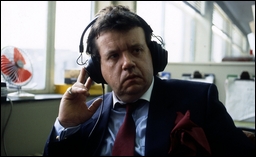
Would you say your big break was Edge of Darkness?
Yes, that was a huge break. It was a show that touched a nerve with the viewing public in Britain. I remember hearing about the reviews as it came out being ecstatic. I remember it was on for six weeks and then I heard it was going to be repeated. I rang the office to check and I asked for the date, which they told me and I said: ‘Hang on, that’s next week!’
They told me it would air on Monday and Tuesday; two nights in a row in two halves. This had never happened before! The show had got an instant repeat and been transferred to the main channel. It was such a big deal. And it won lots of Baftas, for Bob Peck who was main lead, for Best Show. I didn’t realise, but someone told me later that my character was in the running for Best Supporting Actor. I got down to the last five or six. It really changed my life. Because so many people saw it, I did get a lot of offers after that. It was a change and a big step forward!
Of those opportunities from Edge of Darkness, what was the next step?
I had changed my agent before then, but I remember saying to my new agent Pippa Markham at Markham Froggart & Irwin that I wanted to do a movie. She was very good and I knew that she had a lot of actors on her books that had done movies. She got me a movie in Hungary called Grizzly 2; about a bear that attacked a pop concert. I went off to do that and then suddenly she said to me: ‘There’s this film that you’re up for in the States, it’s called Ace Ventura: When Nature Calls.’ I didn’t know anything about it, but apparently it was with this guy called Jim Carrey. So I told my kids and they couldn’t believe it! At the time I said that if I needed to go over and meet them I would. Pippa said: ‘Hang on, hang on, I’ve sent them some tapes of you in Chef,’ which was a TV comedy show I did with Lenny Henry. Eventually they made an offer, and I got it! That was like Edge of Darkness, that was a turning point that launched me in America, took me to the States and got me involved in film in a big way. I was the second lead in the show and it was a big step forward. In fact, I went to the states and stayed, I spent the next 10 years in America working on various projects. Ace Ventura was the catalyst that took me there.
But you didn’t actually audition?
What happens is that your agent has links. Pippa had big links with America and big links with casting directors, so the casting director for Ace Ventura would have been in touch with Pippa, and also other agents in London, saying: ‘We are looking for an English guy to play this safari character with Jim Carrey in the film.’ And she would have suggested me, and perhaps some others from the agency also. They would have seen photographs and tapes and so that’s how they got interested in me. I was desperate, I said I’d go, I’d fly over there, but Pippa said: ‘Hold on, hold your horses, I think we are nearly there.’ Eventually she told me: ‘You’ve got it.’ Normally, you would go and meet the Director for a part, and read for them. Nowadays, that’s all gone out the window. You can pick up your phone and record a video audition and send it in.
After you knew you had the part, do you remember travelling over to Hollywood?
I remember very well. There was a stretch limo that came to pick me up from my house in the Cotswolds and took me to Gatwick Airport. I got on the plane; first class travel and it was first class the whole way through. Ace Ventura: When Nature Calls was set in Africa but we didn’t go to Africa. Half of it was filmed in a safari park in Texas, where if you had a lot of money you take your shotgun to a waterhole and shoot animals like zebra. As you left the park there was a taxidermist and you could get the head stuffed. It was an extraordinary place. We spent half the time there, and the rest of the time in Charleston, South Carolina, where it was more tropical.
How did you get on working with Jim Carrey?
Working with Jim Carrey was extraordinary. I worked with him for four months, every day for four months. And I have no idea what he is like as a person. From the moment he steps onto that set to the moment he leaves it’s a performance. He is performing all of the time. There is an extraordinary thing that happens where these big films take a long time to do lighting. You have to shoot one way, then turn around and shoot the other way. During that time, normally two or three hours, you would go away while they did all the set-up. You’d go back to your trailer, have a cup of coffee, read a book, have something to eat. Jim Carrey would stay on set and entertain all the electricians with funny jokes, funny walks, musical instruments, gags and all the rest of it. And he never stopped. It was phenomenal. And it’s great! But try and get close to him, to get to know the individual, you can forget it.
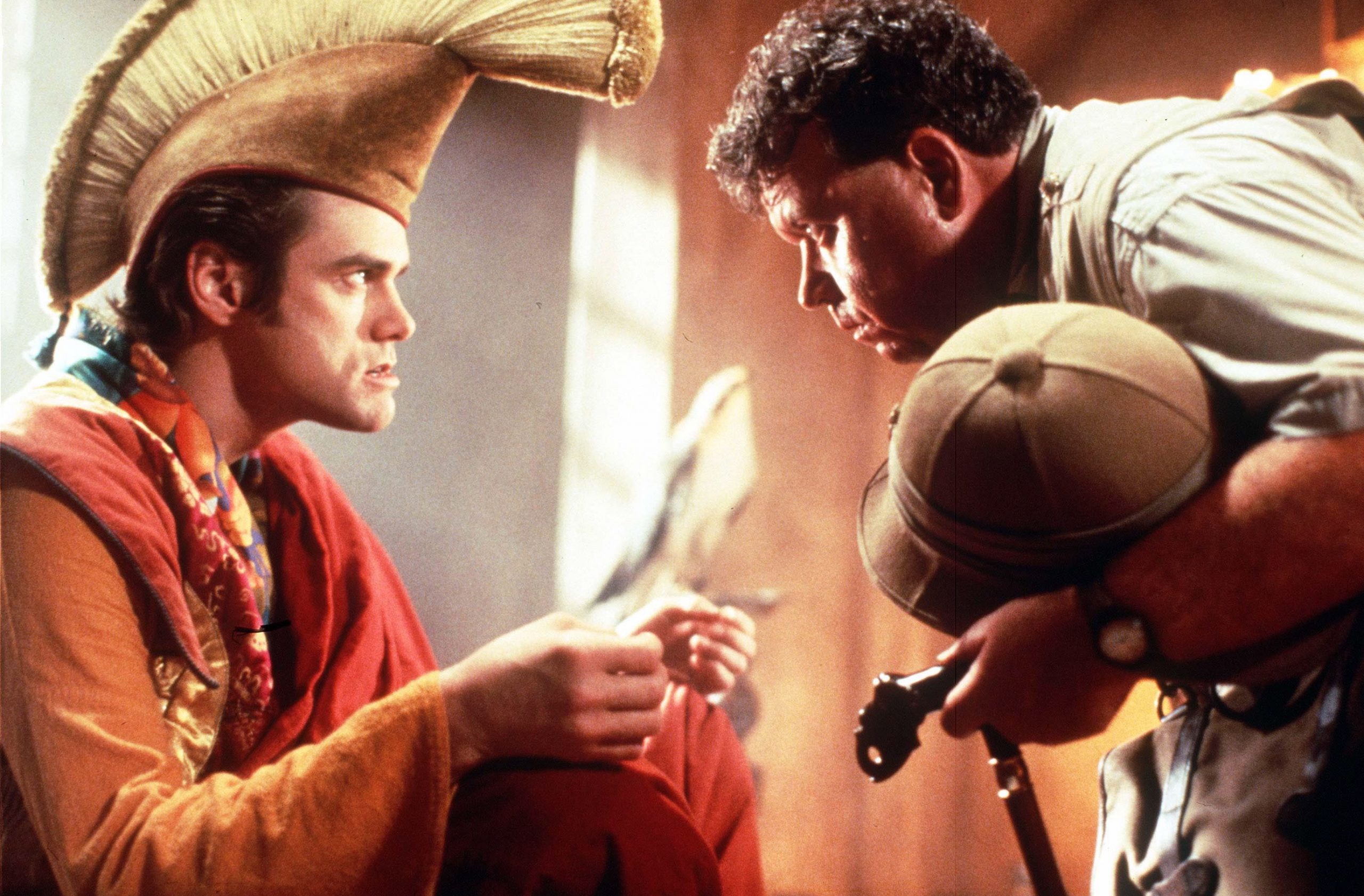
He must have been fun to work with though?
He would improvise all the time. I mean, throw the script out the window. The script that I had didn’t bear any relation to the film we made. Because it’s all improvised and I thought: ‘Oh blimey!’ I was known as ‘reaction-Jackson McNeice’ because I could react to what he said and I could just basically work out when I think he had finished and then come in with my line. And that’s what he thanked me for. It was like a baptism of fire this stuff, but it was phenomenal!
Did it ever go wrong?
There was one afternoon I remember very well where he was talking about something and then he’d do a rewind ‘screech’ effect. But he couldn’t quite get it so he just walked off the set. People asked: ‘Is Jim coming back?’ But he went home! He said he’d pick it up in the morning. It was 3pm, we had three or four hours to shoot but we couldn’t do anything because he wasn’t there. The next morning he came back in, and he just did it. It was a magical moment.
Did that kind of thing happen often?
From very early on Jim wasn’t turning up because he hates mornings! When he arrived he’d go into make-up and he’d be on the set about 11.30am, so they were losing hours of work. Eventually the producers were pulling their hair out and went to see him to say: ‘Jim, is there any chance you could maybe turn up just a little bit earlier so we could start earlier?’ I was on the set and I heard this and he turned to them and said: ‘Do you want an opening weekend of $40 million? Because I can give you that.’ And that’s exactly what he did! When Ace Ventura opened, it opened to the biggest opening weekend they had ever had. $45 million dollars I think, at that point that was the biggest.
How did feeding off Jim Carrey affect your part?
I learned very early on what was needed. I needed to give him his space, and understand that OK, we aren’t going to do the script, but I will keep to my dialogue, which is important. My script had a lot of storyline. A lot of his stuff was improvised so I had to give what was going on in the story to people and I knew how to do that. The other thing that happened, towards the end of the show, was a big news article on Newsweek about Jim Carrey being Hollywood’s first $20million dollar man. His next movie was going to be Cable Guy, and he got $20 million! So I said to him: ‘How does it feel?’ He said: ‘It’s like getting a golden birthday cake every day of your life.’ But this was the same guy that wrote a cheque for ten million dollars to himself before he was successful. Extraordinary.
What was the reaction being around him?
He was very private. I didn’t see him during any downtime or afterwards. My kids came to visit in South Carolina, and I knocked on his trailer door. He said: ‘What is this, The Waltons?’ So he was fun. It was during this period, Ace Ventura, that I met my present partner, Cindy Franke. She was a production co-ordinator on the movie and we got to know each other on that movie and we’ve been with each other ever since.
There’s talk of an Ace Ventura 3.
Yes, I read that too. To be honest, I don’t think Jim Carrey would touch it. I think if they do it, it will be a younger actor playing him. I cannot see for the life of me why he would go back and reprise Ace Ventura. But if they came up with a script that was interesting and he could make it work, then it might be a possibility.
Would you be interested?
Well, that was a very specific story, about him going to Africa, and I think if they did it again I don’t think they would be going back, just as the first one was set in Miami. I think it would be a different plot-line. I’m sure it would be a whole bunch of new actors. I’m not sure there’s a chance of me being in it, but never say never!
Who else have you worked with that stood out?
Well, the first one would be Anthony Hopkins, in 84 Charing Cross Road. Such a delight. An actor to watch and think my God it looks so incredibly easy what he does. But I know it’s not! He can do any voice, of any actor. I think they actually used him for re-voicing some of the actors in Lawrence of Arabia who are no longer with us. I also worked with Johnny Depp, in From Hell. He was an absolute joy to work. Another actor who didn’t turn up early! We’d be waiting for him for quite a while to come out of his trailer.
Not a huge surprise to hear.
Obviously there was Conspiracy, with Kenneth Branagh and Stanley Tucci. Years ago, my agent rang and said: ‘There’s a young actor called Kenneth Branagh that wants to call you because he wants to offer you a role.’ Nobody had heard of Kenneth Branagh at the time. So this guy rings and says: ‘Hi, I’m doing Romeo & Juliet at the Lyric Hammersmith and I’d love you to play the part of Mercutio…and also the Friar.’ ‘What, the two of them?’ I replied. ‘Yes, you’ll go on as the Friar, put the hood on, you’ve only got time to take the hood off, then you’re Mercutio. I’m directing it too.’ It was £110 quid a week, and I had started doing television by then, so I decided to let that go because it looked like a lot of work for no money. Years later I get another phone call, saying Kenneth Branagh – I know who he is by now – is doing As You Like It at the riverside studios and would like me to play Toby Belch.
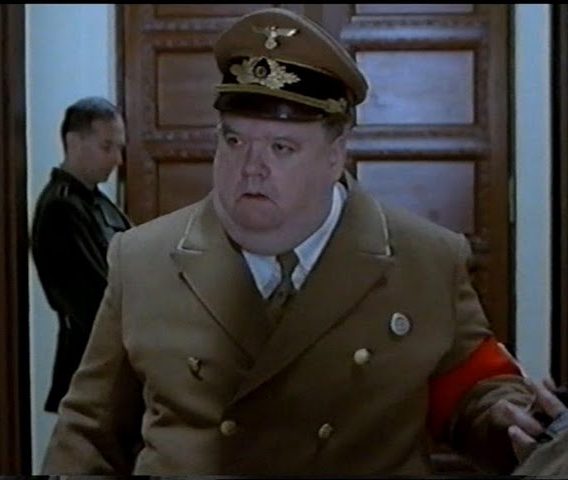
I asked: ‘How much?’ ‘£150 quid a week, but don’t worry because he’s got that guy from The Beatles doing the music, Paul McCartney.’ I said: ‘That’s great, but I can’t do £150.’ So I turned that down as well! Looking back, if I had done just one of his jobs, I would then have been in his movie career, because he is so loyal. All his actors appear in all his movies that he’s done! I then met up with him when we did Conspiracy, and there was a smile on his face as we bumped into each other. Conspiracy is one of the best things I’ve ever done. Kenneth Branagh is fantastic, and Stanley Tucci. And Colin Firth was in also it. That was a real highlight.
A great cast!
Another highlight was working on Valkyrie, with Tom Cruise. You hear the stories on the grapevine before you turn up that you can’t look at him and so on. It’s absolutely untrue! He is so kind, warm and friendly. There was an extraordinary moment on the first day I was there, he came across to meet me and he lists things that I’ve done! Now, whether he has watched them or not, I don’t care. Even if his assistant said to him ‘Ian McNeice etc, mention these when you go and meet him.’
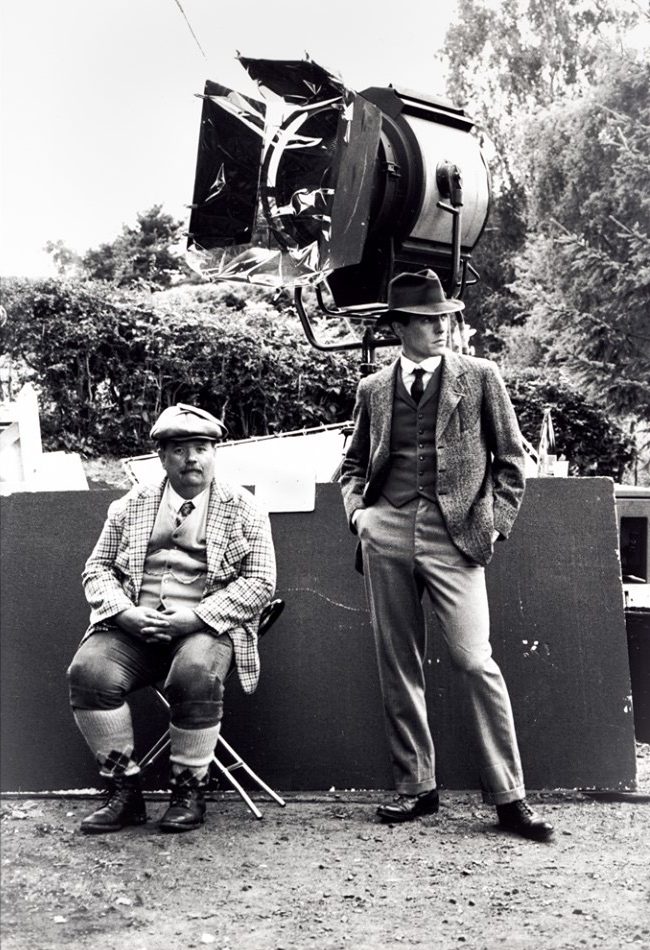
But you stand there open-mouthed as Tom Cruise talks about some of the work you’ve done and how much he enjoyed it. It doesn’t matter if he’s never seen anything!
It’s a nice touch.
It’s a beautiful touch. He welcomes you in and it’s great. It was a joy.
You also worked with Hugh Grant on The Englishman who Went up a Hill but Came down a Mountain?
That was made by a guy who I went to Taunton School with, Christopher Monger, who was writer/director, and he wrote a part specifically for me, which was lovely. We were mates at school having met at 16 and I’m still in touch with him, we’re still great friends. I remember Hugh in the make-up room every morning with a stack of tabloids, looking through them for any comments about him, as he was just about to hit the stratosphere with Four Weddings and a Funeral. He was just on the verge of becoming a big star and he was looking for bits about him in the papers.
And you worked with Cameron Diaz?
Cameron Diaz, yes I did. How about it! There you are, it’s a sunny morning in Malibu, in this big house overlooking the ocean, and there’s this blue swimming pool. I’m standing on one side of the pool with an apple on my head and this vision swims up-and-down the pool, gets out, walks around, aims a silver revolver at my head, shoots, and the apple explodes on my head. And I’m thinking to myself and I get paid for this? This joy of being shot at by Cameron Diaz in a beautiful swimsuit. This is the boy from Basingstoke?
The same guy that once swept the floor in Salisbury!
Yes, absolutely! (Laughs) Talk about highlights, that was megastar highlight. And that night, when we finished filming we travelled back with the producer and Cameron in the car. Cameron said: ‘Can I drive, please?’ They said: ‘Sure’. And I’ve never been in a car like it! It was almost like Formula One. She was this extraordinary, incredibly fast driver. I got out of there breathless. It was an extraordinary experience. We shot through town like a bullet.
That’s something to say: Cameron Diaz was once your driver.
(Laughs) Yes, you could say that! And she was. Such a sweet girl and so unaffected. A joy to be with. I also worked with Milos Foreman on Valmont. He directed One Flew Over the Cockoo’s Nest. To get a chance to work with him was amazing. I’ve been very fortunate.
These days you’re well-known for working with Doctor’s, first of all Doctor Who.
I’d made a conscious decision around my late 20’s, early 30’s to not do theatre, because I’d started having children, and it paid so badly. I said to my agent, Pippa Markham, that I needed to do film and television. I then didn’t do any theatre at all for seventeen years. One day I got a call from my agent saying: ‘You’ve just had an offer…it’s the National Theatre.’ I said: ‘Er…well…theatre.’ She replied: ‘Hang on, hang on. It’s a play about Harold MacMillan. Jeremy Irons is playing Harold MacMillan and they’ve offered you Winston Churchill.’ I suddenly went ooh! I’d got most of my kids through college, I’ve only got Maisie in Dublin at the Art College there and I think I can handle that. So, I went in and I had a chat with the Director, Howard Davies, and I thought this will be great. I didn’t tell anybody that I hadn’t worked in theatre for a long period of time, including the Director, because I think he would have freaked out! So I stood on that stage of the Lyttleton Theatre on my first preview thinking what am I doing? This is ridiculous.
But you got through it?
Somehow I got through it! And what it did do was lead me to realise that I would have loved to have gone back to theatre so much earlier. I managed to do another two or three plays; I did Henry VIII at the Globe, which was fantastic, playing Cardinal Wolsey. But while I was in the National theatre, the casting people and Director came from Doctor Who, because they were looking to cast someone to play Winston Churchill.
How had you prepared to take on a role like Churchill?
I started with all the television and film I could see; watching all of the other actors who have played Winston Churchill and there have been very many. Obviously there is quite a lot of film of him doing his speeches and they’re all on tape which you can listen to as well. I went to Chartwell, where he lived and I went around his art museum. I also went to Blenheim Palace to see where he was born and I went to his graveyard. So there’s all that preparation. But instead of doing a caricature I sort of got an essence of the man. His humour, the twinkle that he had. His speech mannerism. The most extraordinary thing I found out is that he called Nazi’s ‘Nasi’s’. (Puts on a Churchill voice) ‘Those damn Nasi’s. What are we going to do about these Nasi’s?’ So I put that into the script wherever it cropped up. So it was all those things. I remember one evening where the family came to see the play at the National. That was terrifying!
It’s a character that people have familiarity with.
What was lovely was the amount of people that came up to me over the years to say they loved the performances. A lot of people say; ‘What’s it like to win an Oscar?’ (Laughs) They think I’m Gary Oldman!
What were the main differences between your Churchill’s?
Totally that less is more. On stage you need to reach the back of an auditorium of 1,000 people so you have to make it expansive and energy-wise you’ve got to push it out. For a performance on television you’ve got to bring everything right back and make it more internal and a bit more contained. That’s the differences between the two performances really.
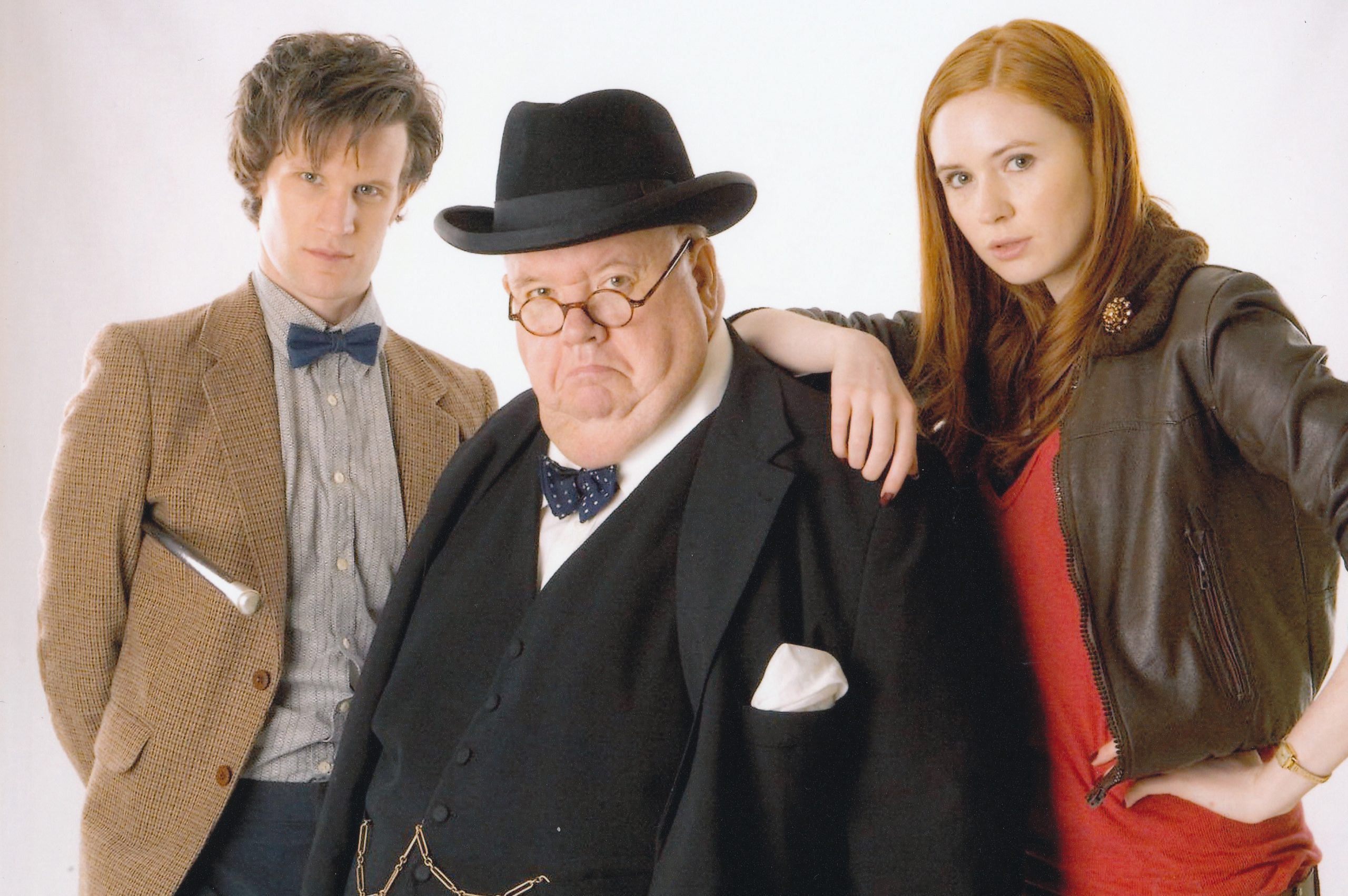
Did you enjoy working on Doctor Who?
What was fun about doing the show was working with Matt Smith and Karen Gillan. They were still very new to it and he was still finding his way. Being very inventive, coming up with new ideas; he was such a joy to work with as she was. That was very nice. We worked in this bunker just outside Cardiff with a set where they recreated the Churchill War Rooms. But we couldn’t smoke in there. So I said: ‘What are we going to do, he’s got to have a cigar?’ So the special effects rigged something up. It was the very early days of e-cigarettes, and an early model that they put into a cigar wrap which blew out some smoke. It looked exactly like the real thing! And that led to the most extraordinary thing that I didn’t even know existed, which was the world of conventions. For the next year or two I went all over the world, including Australia and America being invited to Doctor Who conventions, turning up, signing autographs, chatting to fans, having photographs taken. Even a Caribbean cruise, a Doctor Who Caribbean cruise, which was the most extraordinary thing. There were around 3,000 people on this boat including 90 Doctor Who fans. You have dinner with them and chat to them and the rest of the day is yours. That was seven days of bliss around the Caribbean. Amazing!
Some nice perks of the job!
Absolutely!
Having portrayed Churchill lots of times, what do you think about the perception of Churchill today?
Yes, they had to protect his statue in Parliament Square during recent protests in London. It’s a tough thing really. Having played and portrayed him I can understand those views and accusations. But I think there is so much more to him than that. I still have a huge amount of respect for him, although I am aware of that side of him, which was not his finest hour.
Speaking of history, you were also in the series Rome?
I was sitting at home one day, and I got a phone call from Frank Doelger, who I’d worked with on Conspiracy, and he said: ‘Ian, I’ve been making this series called Rome.’ I said: ‘Yes Frank, for goodness sake I’ve been wanting to get in it!’ He told me: ‘We’ve completed the first 12 episodes, but there’s something not quite right. I’ve come up with this idea of a newsreader character that will give information about what is going on in the show that will help people understand it a bit more. Would you come out and do a test?’ So they flew me out to Rome, they gave me the script and the researcher said that these newsreaders were failed orators, but they had this way of speaking, of gesturing. So I had a look at some books and thought I could incorporate these gestures and make some of my own. So we did a couple of these inserts, with costume and extras and we filmed them on the back lot in Rome.
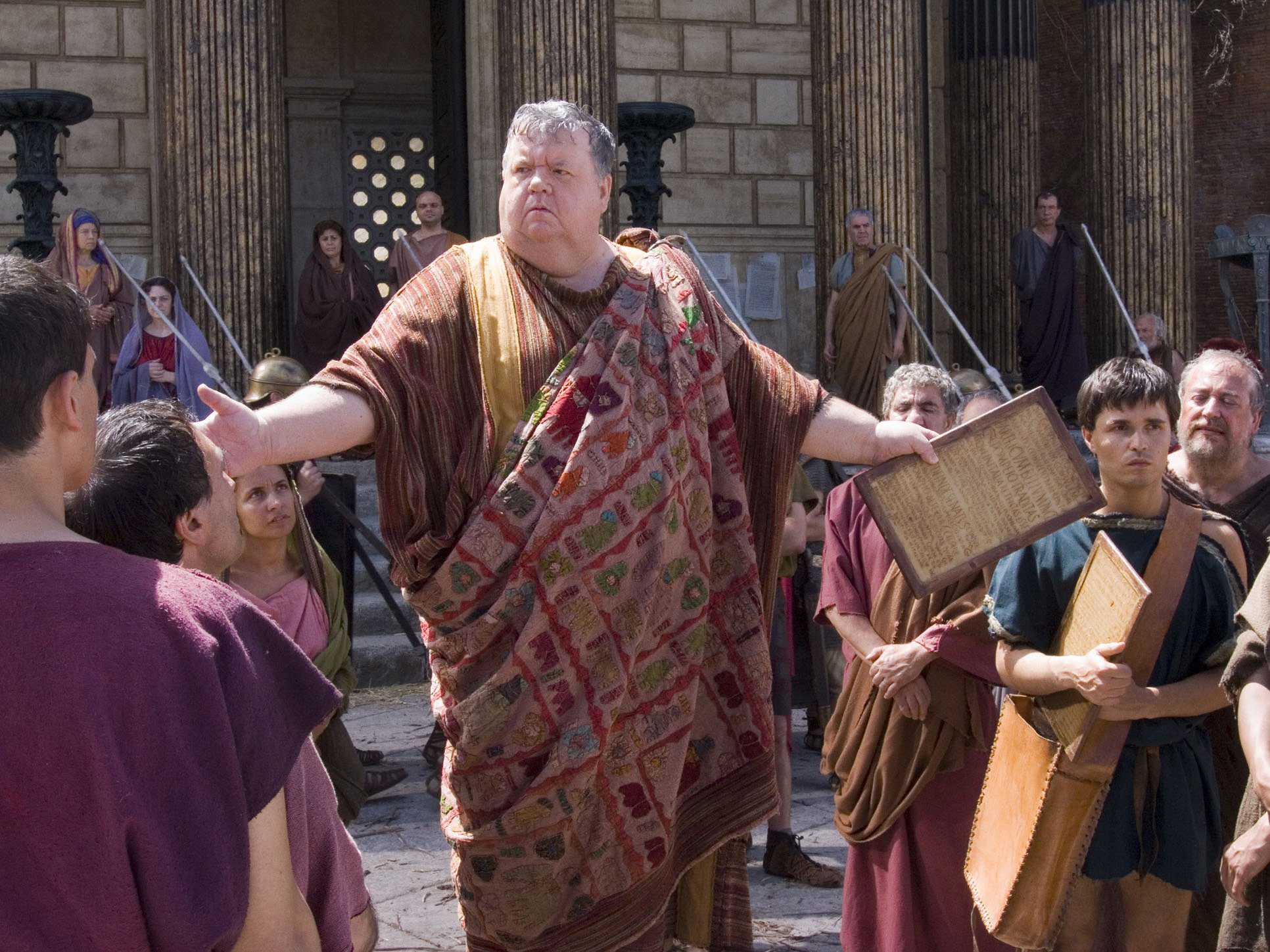
And they sent it back off to HBO. Then about two or three weeks later Frank rings back and says: ‘They love it! Will you come out and do the first season?’ I asked what that meant and he said: ‘We’ve got twelve episodes and we’ve got to fit you in.’ He said it would take a week to ten days, so I thought great. I went out there, and filmed all the inserts. Ken Cranham, who was one of the main actors, heard about this and blew a fuse. He’d been out there for a year, making twelve episodes, and there I was getting paid for 12 episodes and doing it in ten days. So that was a coup!
I watched all this earlier. All of your sections are actually chained on YouTube.
Well that’s my ten days! My ten days in one go.
Is it true that you auditioned for Harry Potter?
So, the character Professor Horace Slughorn was down to two actors after they had done their research. One was myself, and the other was Jim Broadbent. And he got it. Jim Broadbent was actually in the year above me at LAMDA, and I worked with him on Around the World In 80 Days, with Jackie Chan. I did audition right at the very beginning for the part of the Uncle (Vernon Dudley) which was played by Richard Griffiths. I remember very very early on when I was in Los Angeles meeting Chris Columbus for that part. But I didn’t get it. Then years later the part of Slughorn cropped up. I didn’t actually meet anybody, but my agent was saying: ‘They’re still interested, they’re still interested.’ Then eventually I hear that wonderful thing: ‘They’re going in a different direction Ian.’ (Laughs) That’s my bête noire!
So what happened with Game of Thrones?
I was over in Dublin visiting my daughter and I got a phone call from my agent saying that the Producer Frank Doelger, who I worked on Conspiracy and Rome, wanted me to go to Belfast to meet the Director, Tom McCarthy, for a part in a pilot for a new series called Game of Thrones. I found out that they’d actually given the part to Richard Griffiths, but there was a scheduling conflict so they asked if I would go along and read for it. So I turned up in Belfast and met the Director, who was American, and Frank Doelger, who was producing and I did a little reading with them. They went away and five minutes later they came back and said: ‘We think it’s terrific, would you come and do it? We’re going to go to Morocco to film the pilot and this role.’ So I did, I went out to Morocco and the guy that wrote Game of Thrones, George R.R. Martin, was there. He was a huge Dune fan. After filming I went away and with pilots you don’t know if it’s going to be made or not, so we were waiting to see if there was a green light for it. My agent eventually said: ‘The part of Daenerys – they want to recast that.’ I thought that if that was the case then most of my scenes were with her so we’ll have to go back to Morocco to do that and re-shoot.
That doesn’t sound too bad.
So, time goes by, and I received another call from my agent who said: ‘Ian, do you want to sit down? The thing is, they want to redo that whole section you were in and so they are going to reshoot it without you. They’ve got another idea of what they want to do with it.’ I was flabbergasted, but thought fair enough. I emailed Frank Doelger asking what the problem was and he got back to me and said: ‘They want to make that section sort of Asian.’ So I said fair enough, and that was that. Then a little while goes by and I was reading a trade magazine and saw a piece that said: ‘Due to scheduling conflicts, Ian McNeice will no longer be playing the part of Illyrio Mopatis in Game of Thrones. It will now be played by Roger Allam.’ And I thought, Roger Allam? That’s the funniest Asian guy that I’ve ever seen, he looks exactly like me! (Laughs) So I emailed Frank Doelger and said: ‘Asian? Roger Allam?’ But I never heard another thing.
That was it? Was the scheduling conflict actually true?
No! They fired me. They said they wanted to go ‘Asian’, whatever that means. I never got to the bottom of it. I have no idea why they went with someone else instead of me. Ours is not to reason why! Although years later Game of Thrones became huge rolling stock. I was so glad Roger Allam got killed after two episodes instead of someone who went all the way through. That was a blessing in itself. My name was mentioned for other roles, which never came to fruition.
Where did your story of Doc Martin begin?
As always, everything starts with an agent and a phone call. I had this rule of thumb that if it’s a one-off I won’t really spend a lot of time looking at what I have to do. But if it’s a series, or something over a length of time, then I’ll learn the script and work on it. With Doc Martin I just was told I was playing a plumber, but I didn’t really know much about it, so I hadn’t learnt it. I met the Director, Ben Bolt, who I knew, and the producer Phillipa, who is married to Martin Clunes. I met them and I read the part of ‘Bert the Plumber’ in a sort of vague Cornish accent. So we did it, and then they said: ‘Would you read a couple of scenes from another episode?’ I said: ‘What?’ Another episode, I thought is this a series? In that moment, I thought oh no! If I’d known I would have tried really hard. But I said: ‘Sure, why don’t I look quickly and we’ll go through it.’ Walking away that day I thought well, that’s it. But, what the hell. But I got a phone call that night: ‘You’ve got an offer! To play the part of Bert.’ It was by the seat of my pants I got that one! So, we turn up and make the first series. And we all go away thinking that’s probably going to be it and we have had a very nice time. But the rest is history!
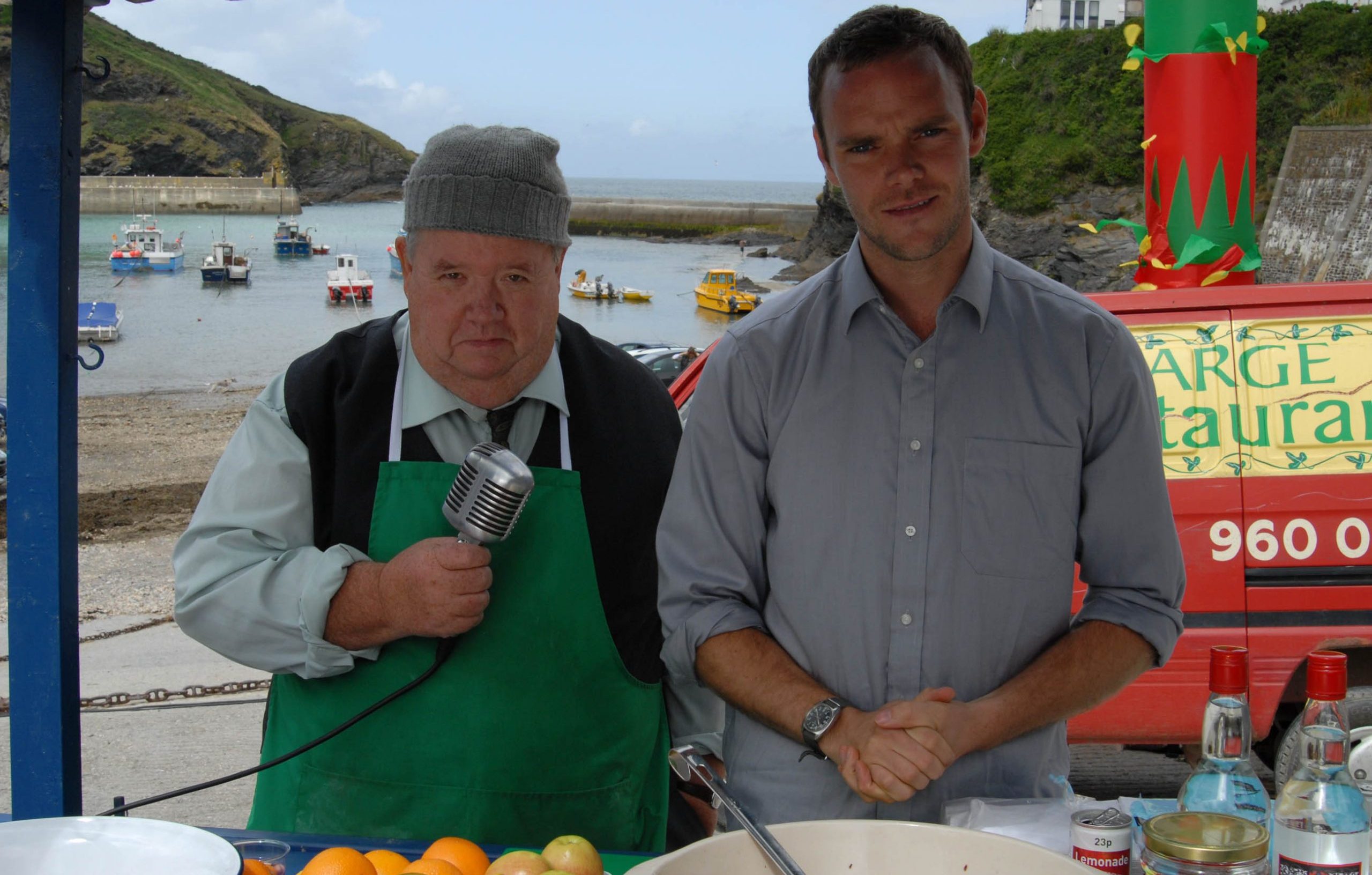
When you first heard about it, did you know that Martin Clunes was Doc Martin?
No. I didn’t. All that stuff came out later when I saw the movie that they made. The original one with him.
Saving Grace?
Yes, Saving Grace, the movie in which he appears as the very first ‘Doc Martin’ and the stuff he did with Sky later. I had actually worked with Martin before on a movie called The Russia House, which we did together in Lisbon. We became very friendly in that shoot. So much so that he actually came up to the Cotswolds on a couple of occasions and had weekends with me. I was really looking forward to the opportunity of cementing that friendship again having worked together before.
So at the end of the first series of Doc Martin you thought that was it. When did you find out that wasn’t it?
The same thing happened with every series, we’d get to the end and we never knew if there was going to be another one. What would normally happen is that we’d film it until the end of July when all the schools break up. Except the first year when we went into August; that was a calamity, a nightmare! We’d finish the series, then they’d rapidly put it together and it always aired around the end of September, early October. They’d look at the ratings, talk to the people at ITV and only then would they make up their mind. So, around Christmas time we’d get a call to say if there would be another series. But everyone is always very keen to know whether there is going to be another series, and I’d actually worked out there was one person who would know before anybody else. Do you know the story?
Is it about a farm?
So, all of the interiors; the Doctor’s surgery, his waiting room, the kitchen from my restaurant, were all done in a barn. It was a very successful place because it means when it’s pouring down with rain we can go and work in the barn. I realised that the first person to know whether we were going to make another series was the farmer, because the farmer had to be engaged for another two years as they were renting the barn. Would they need to knock down the sets and so on? So I used to ring Robert Slowman (the farm owner) and say: ‘Robert, have you heard?’ ‘No Ian, I haven’t. I promise I will get in touch if they do.’ But he didn’t and I’d always have to make another call round about January and he’d say: ‘Yes, yes it’s all green lit, we’re going to go again.’ I thought to myself where in Hollywood would you be ringing a farmer in the middle of nowhere to find out if you’ve got another year’s work in front of you? Such a joy!
Would that have made you one of the first amongst the cast and crew to know?
Yes, but I kept it quiet. I didn’t want to say. It was never absolutely confirmed, because things can go wrong. You’ve got to have the confirmation from your agent and the producer. If I started going around telling everybody: ‘Yes! Yes! We’re on,’ and then something happened it wouldn’t be great. I always waited until I heard the official confirmation, which wasn’t too long after hearing it from Robert. I’d get the confirmation from my agent and Phillipa.
At its peak, Doc Martin attracted more than 10 million viewers here in the UK. What is it about Doc Martin that makes it so loved?
The success is because of a few things. For a start, the grumpy Doctor was a stroke of genius. Everybody loves the banter that goes on with the Doctor and how he treats his patients. And the charisma of Martin Clunes – that’s pure weight of gold. So there’s him. And there’s all the other characters which are very well drawn and quite eclectic. Another factor is the village (Port Isaac), which is a huge plus for why people watch. The village where it never rains! It’s always sunny! Every script that you get at the beginning it says: ‘Another sunny day in Port Isaac,’ and you’ve only got to look at some of the clips from Doc Martin to realise that if you look down, the ground is wet because it’s been raining again and that sun has bounced the light of the silver boards onto your face to make it look like its glimmering! All these factors contribute to its success. Plus the fact that it’s quirky. Some of the storylines are out there. Quite wacky!
Had you been to Port Isaac before you started filming? Did you know it would become a key part of the success of the show?
No, I hadn’t been before and I honestly didn’t know. I fell in love with it straight away because it’s the most enchanting little village to be in. And we were very fortunate. They give the actors the opportunity to stay in a cottage or a hotel. So I chose a house with a few bedrooms, because I have kids that will want to come down and so on. They found me this brilliant house in the village, which I think was going to go to Martin Clunes, but he decided to go outside of the village, quite rightly. So I got the most fantastic house and we’ve been so fortunate every year to go back. My kids have grown up there, they all learnt water skiing and surfing. They’ve had a marvellous time. And we ran a B&B for all our friends and family who come down and stay with us. It’s incredible. To actually be picked up there in the morning to go to work and arrive five minutes later down in the village is the joy of all joys. Talk about a commute! It’s incredible! I wasn’t aware of how the village would hit people. I was just involved in the storylines. I can just remember, coming to the end of it thinking again goodness me, I’m getting paid for this? It was the most idyllic time to spend the summer there, have the kids there. We started in the first series to get to know some of the villagers, and become interested in what they do and that was the beginning of my love affair with Port Isaac.
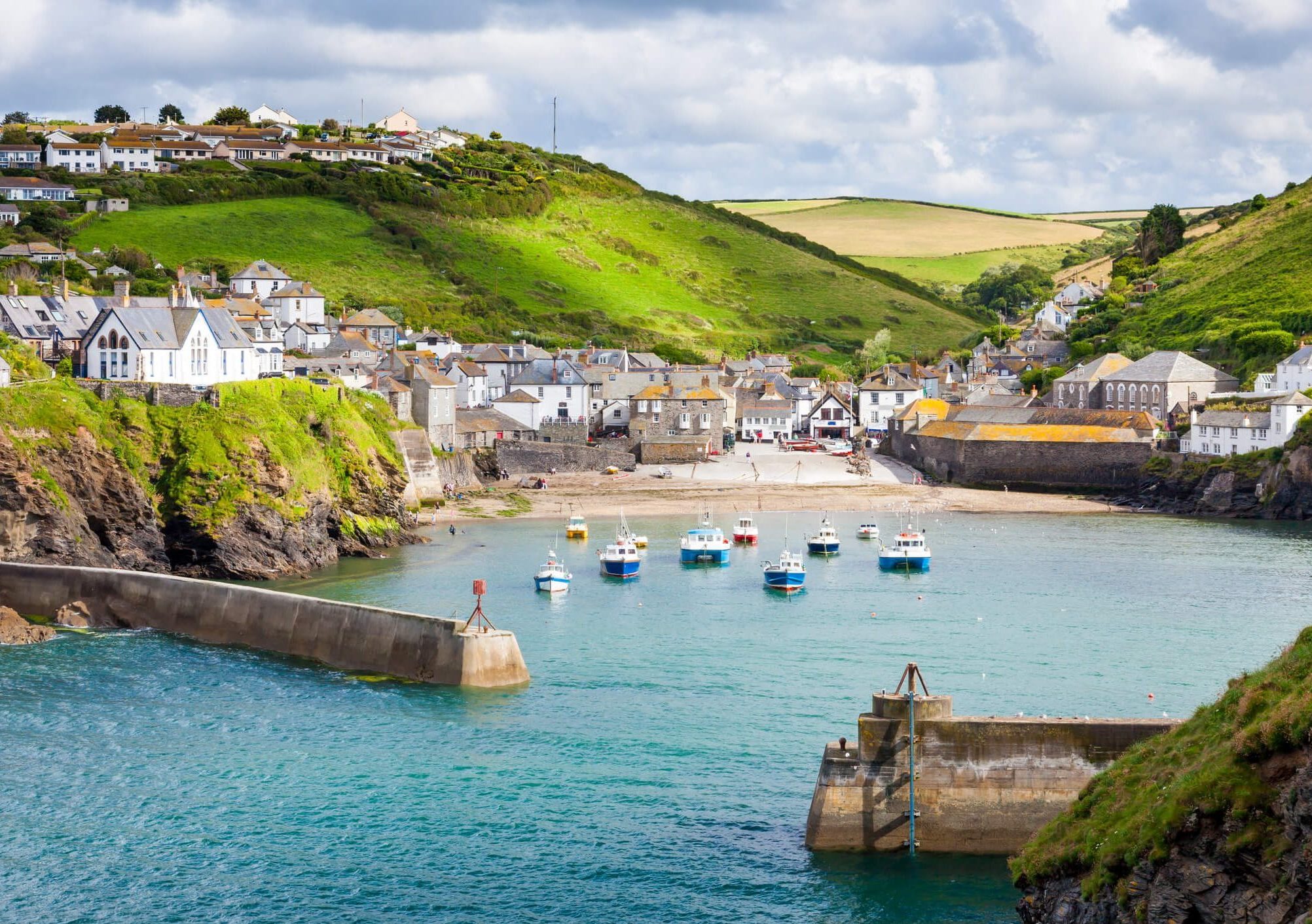
Many say your portrayal of Bert does a great job of encapturing a Cornish character. How have you connected Bert to the area?
One of the things I thought was missing was some ‘Cornish-isms’. There’s a lovely lady called Nicky Bradbury who runs the pasty shop, who I’ve now become very friendly with. Not only because I love her pasties, but she’s an institution! I used to talk to her, and ask what words I could use and slip into the show. And so I would get this myriad of little words that I could put into the script that made it more Cornish. It started with (puts on Cornish accent): ‘Proper job. Oh, its proper job.’ ‘Tis handsome’ is another one they used to say. I started calling my son ‘boy’ because I knew a lot of people do that. ‘Alright boy? Alright boy?’ And one of my favourites that I ever did is ‘Cheers and gone.’ I managed to scoop that one in when I dropped off the Doc and his bride at the place where they were going to spend their honeymoon as their chauffeur. I actually looked out the window and said: ‘Cheers and gone!’ when I left. It’s a big Cornish phrase. Sometimes Directors would tell me: ‘you can’t say that’ but I told them ‘it’s Cornish!’ We got to the end of one of the series and I got a T-shirt with ‘Proper Job’ on and gave it to the Director, Ben Bolt.
I think Bert is certainly one of the most loved characters.
Well actually the character I’ve always considered to be the second lead in the show is PC Penhale. I think he is the funniest character there is. I think John Marquez as PC Penhale is an extraordinary creation. What he gives to the show is pure joy! We are very lucky. Al, Joe Absolom, is a superb actor in his own right. We are very fortunate and have an incredibly strong cast. Louisa, Caroline Catz, is terrific. Eileen Atkins as Aunt Ruth. And Mrs Tishell, Selina Cadell of course, who is through the roof. She’s another that started off with very few episodes, and is now virtually a lead character in the show. So we’ve really been blessed with a cast this strong, and that’s another reason why I think the show has lasted so well.
I think only two characters have appeared in every episode. One of them of course is Doc Martin, and the other is Bert Large.
Really?! Strangely enough, my on-screen son Joe Absolom’s agent told him: ‘You don’t want to be doing this all the time. I think we can get you other stuff.’ So he left the show, very sadly. In the storyline he went off to South Africa. After a little while he realised what a mistake he made, so he got on the phone and said: ‘I wanna come back!’ Of course they brought him back and I was thrilled!
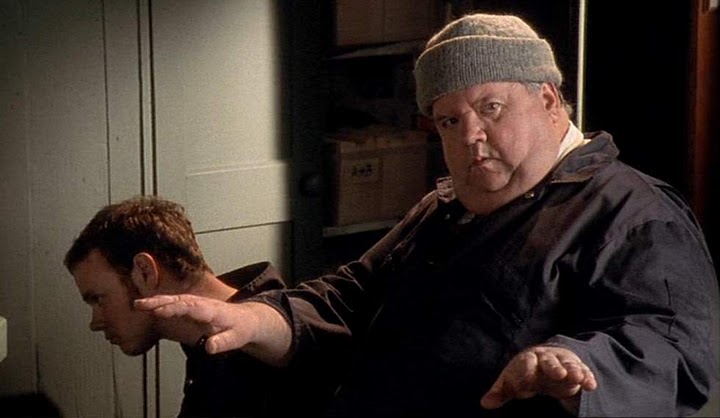
Bert is famous for his ventures and schemes. Do you have a favourite?
Oh, I have lots of favourites. I think the water one in particular, and his whisky distilling business was a joy. One of my favourite moments was when the wardrobe gave me a mask which looked exactly like the mask from Breaking Bad. I thought to myself it’s Breaking Bert! It looked like I was making crystal meth in Portwenn. That was brilliant.
And also Large Tours?
Yes! (Laughs) Large Tours for Twitchers. To take the bird fanciers on tours to the clifftops. There have been so many. Every single one of them has ended in tears. It’s going to be fascinating to see what they come up in the finale!
We now know that series ten will be the last. What are your hopes for the series, and for Bert?
Well, let’s hope that the powers that be will take Bert under their wing and get Bert and Al a spin-off of their own. Let’s pray for that!
So there could be a Doc Martin spin-off?
If you look at shows that have been very successful there’s always the possibility of a spin-off. Like Breaking Bad, Only Fools & Horses, Cheers. There are a lot of people who like the characters of Bert and Al, maybe there a spin-off for them. It’s a hope! But I think Buffalo pictures, who own it, wouldn’t want to do it. I don’t know whether they would relinquish the rights for someone else to pick up. But again, never say never. I will keep my ears and eyes open as we reach towards the end of series 10, to see if there is any possibility.
I think a Bert & Al spin-off would be great! So you would be interested?
Oh definitely. I think Joe Absolom would too. I think we’d be foolish not to do something like that. The chemistry is there, we work well together, it’s a question of whether someone will take up the baton! I’ve got all my Bert Large Lovers writing in and asking for a spin-off, so you never know.
Ah yes, The Bert Large Lovers. The group has nearly 4,000 members now. When did you first hear about it?
For years now I’ve had this extraordinary relationship with a woman called Gloria, who created the Bert Large Lovers Group. I think Gloria wrote to me asking about it, and I said fine, not thinking it would turn into anything! I cannot tell you, to actually be in Kansas, where I visit my partner’s parents who live in Hutchinson, and to be in a supermarket where someone comes up to you and says: ‘Are you Bert?’ I cannot tell you where this show goes and who it reaches. They now have this extraordinary thing, called Bertstock. It’s happened on a couple of occasions, when a lot of the Bert Large Lovers turn up in Cornwall in June and I join them to have dinner and chat with them. We’ve got Bertstock 2022 coming up!
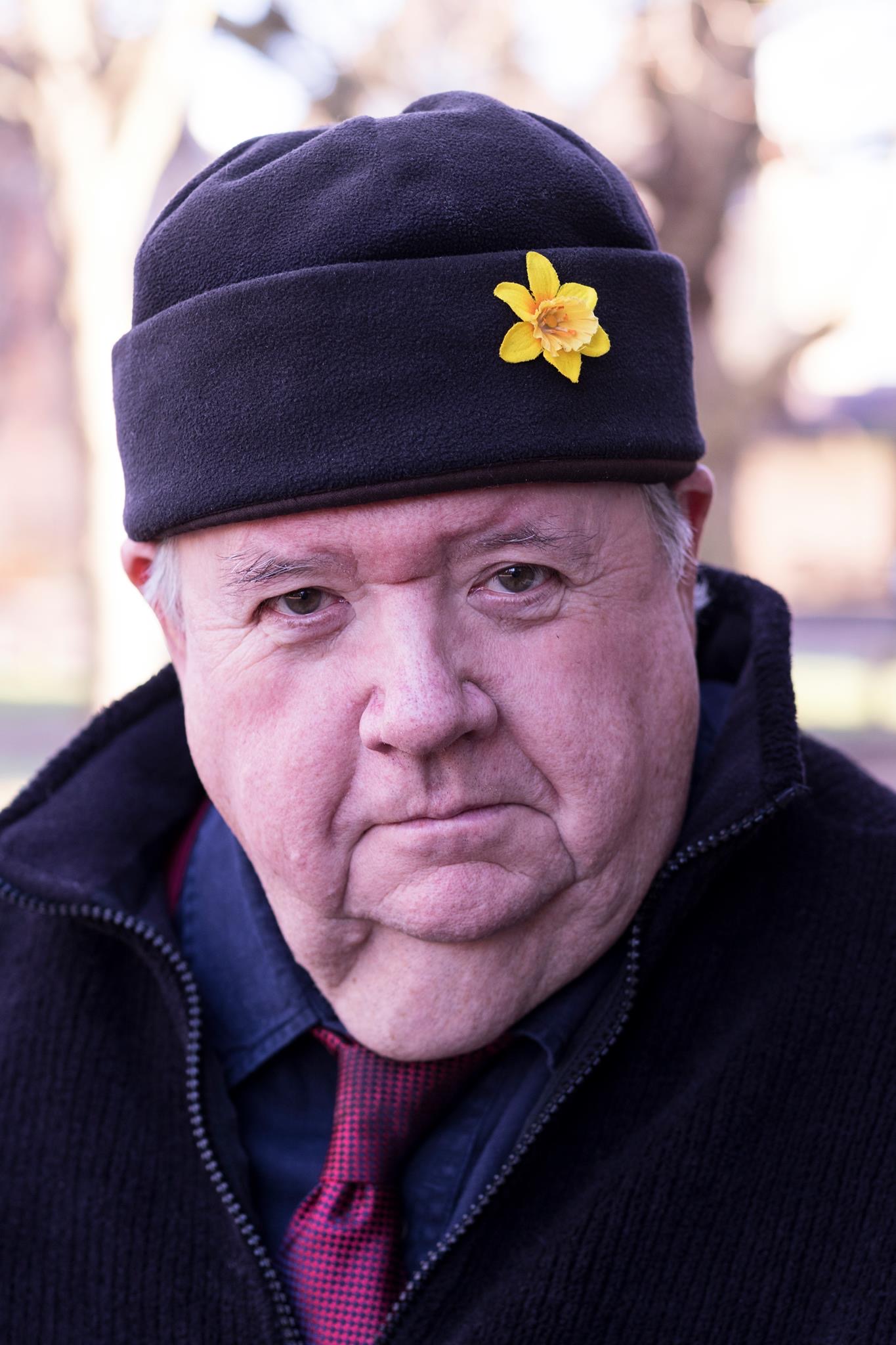
It’s as a result of this that you’ve been described as a sex symbol?
(Laughs out loud) Yes, yes! That turned up in the Daily Mirror I think. I was doing some press for Doc Martin in Los Angeles for PBS. They had me over there to do a junket of interviews. One of them was for the Daily Mirror. When I was talking about the Bert Large Lovers Group, of course because it’s the Mirror, they wanted to put a spin on it. So I ended up as a sex-symbol in this two-page spread. Thank you so much for that!
Given that many of the Bert Large Lovers are overseas, do we need to upgrade it to ‘International Sex Symbol’?
(Laughs even more) I think we do! International sex symbol, yes! Along with Harry Styles. I think I could be the next Harry Styles! (Laughs again) I’ve always thought that maybe we should do a tour of America. We can get hold of everybody and say: ‘Bert’s on a tour and wants to come and have a cup of coffee. Who wants to invite him in?’
Well, if you ever decide to do that tour, let us know and we’ll arrange it!
(Laughs) Yes! I could do it through you! We could do the Bert Large Tour organised by your good self. That would be brilliant. It would be a perfect tour! So, let us know everybody. If people want Bert to come, we will come!
You’ll have to bring your bucket! When did that start and how much do you think you have raised for charity?
Ah, my little green bucket that I use to collect money for charity. Well, I suddenly realised there were all these people in Port Isaac and they all wanted a photograph with me. Well, surely we can make a bit of money for charity? So I say: ‘Put a pound in there and we’ll have a photograph.’ Who would have thought that after all these years it would still be going? Amazing! The last series we did it raised over £7,000. Quite a lot of that went to the RNLI (Royal National Lifeboat Institute). In fact, a lot of it went to a new boat. In November 2019 they invited me down to the launch of the boat, which was really nice. Cancer Relief and also the Village Hall have received money. And also some for the locations manager, Johnny Bamford, whose daughter passed away. They have a foundation called the Pearl Exchange for her, so I donated some money when that started. So probably, four, plus five, plus six, plus seven thousands pounds over the last four years.
That’s a lot of money!
All from one day suddenly thinking let’s see what would happen. But yours was actually the biggest contribution I ever had in one day. To receive all that money was amazing after you’d given your earnings from working as an SA (extra).
I’m happy it went to good causes. What are your thoughts about how your industry, and the theatre especially, has been impacted during recent times?
A lot of people are nervous about whether they can go back and do theatre. And how its going to happen? Are theatres going to open to reduced capacity and can that work for them? It’s shocking.
What would you say to people who might look at the arts and see it as almost ‘non-essential’? How important are the arts and theatre to our country and our society?
Well I think it’s vitally important. In times of great distress and difficulty, its been theatre and the entertainment industry that’s helped people get through. Simply to give people something to look at, to forget the woes of everyday. You immerse yourself in something and forget about all the horrendous stuff that’s going on. You need that. You need that escapism! It’s vitally important we continue. We have this history of having the best theatrical place in the world – the West End. We should cherish that! We should continue with it and it should not be allowed to go to pot. It’s got to be nurtured and brought back. It’s a leading light!
I’m sure much of your work has provided escape to many in recent times.
I’ve had numerous comments that people have got through with series and box sets. It’s extraordinary how it can help people in difficult times.
Looking forward, what are your plans now?
We’ve taken lock down very seriously, so we’ve hardly gone out at all since it began. But let’s see what comes up. I’m looking very much forward to the tenth and final series of Doc Martin.
Credits & Thanks
Images provided by Ian McNeice
Special thanks to Mike Meakins and Derek Stacey
For more info about small-group tours to Cornwall from London, click the link below.
Find Out More